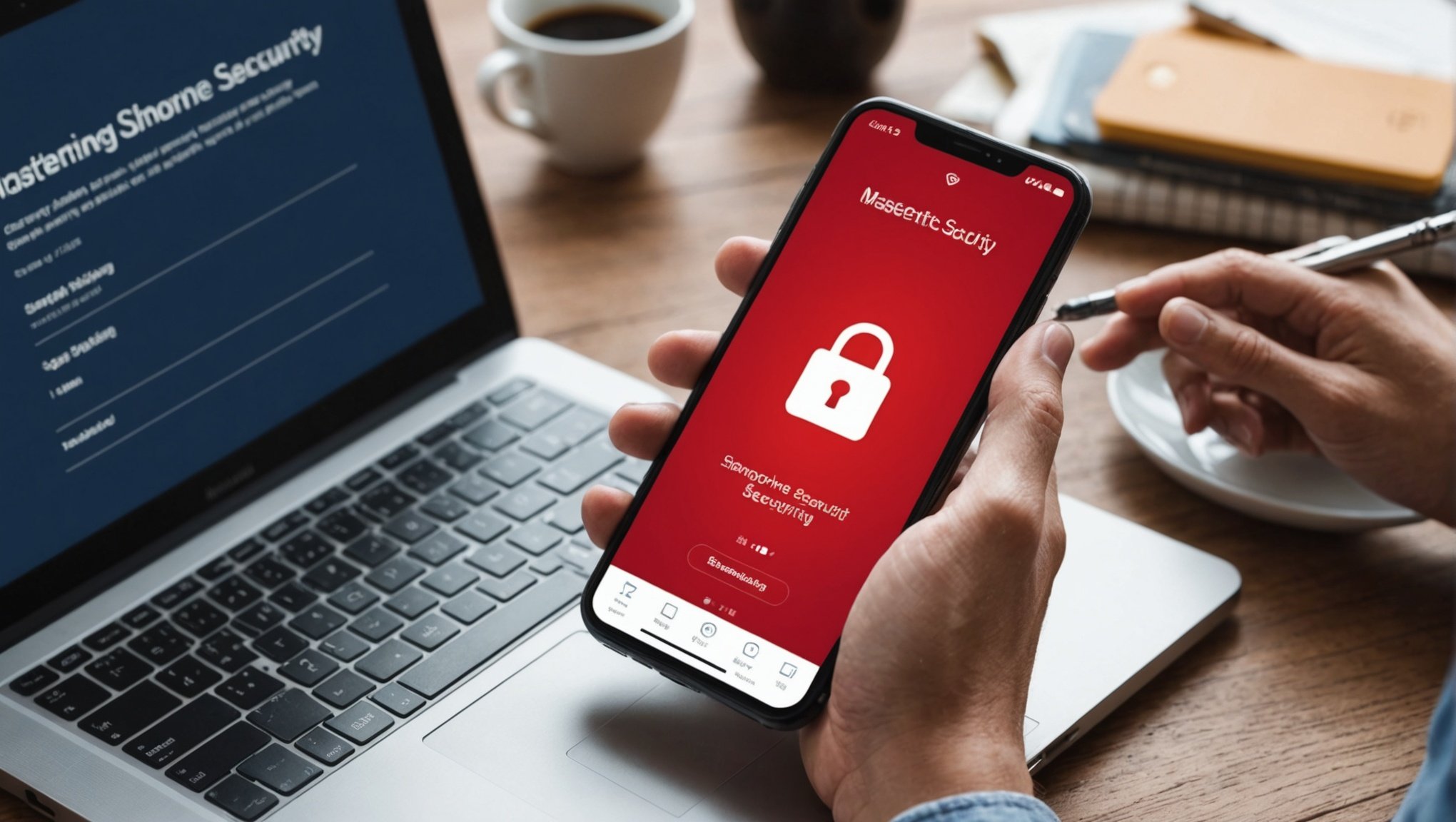Online shopping offers convenience, but it also comes with security risks, especially on smartphones. As cyber threats grow more sophisticated, protecting sensitive information has never been more important. Learn how to strengthen your smartphone security and enjoy a safer online shopping experience. Discover practical tips to safeguard your personal data and make informed decisions while shopping from the palm of your hand. Take charge of your smartphone security today!
Understanding Smartphone Security
Smartphone security is crucial in today's digital age, especially when it comes to online shopping safety and maintaining digital privacy. With the convenience of mobile shopping, it's easy to overlook the potential risks. However, understanding these risks is vital for protecting personal information.
Topic to read : Mastering Real-Time Cryptocurrency Trading: A Step-by-Step Guide to Using Your Smartphone
Smartphones are susceptible to various security threats, including malware and phishing attacks, which can compromise your device and data. These threats are particularly concerning during online transactions, where sensitive information like credit card details is exchanged. Ensuring your smartphone is secure can significantly reduce the risk of data breaches.
When shopping online, it's important to secure your device. This involves using strong, unique passwords for each account and enabling two-factor authentication wherever possible. Regularly updating your smartphone's operating system and apps also helps protect against vulnerabilities.
Additional reading : Mastering Smart Home Water Heaters: Effortless Control and Monitoring Through Your Smartphone
Mobile shopping apps, while convenient, often have common vulnerabilities. These can include unencrypted data transmission and weak authentication processes, making them targets for cybercriminals. Being aware of these vulnerabilities and choosing apps from reputable developers can enhance your security.
In summary, prioritising smartphone security not only safeguards your digital privacy but also ensures a safer online shopping experience. By taking proactive measures, you can protect your personal information from potential threats.
Password Management Strategies
In the realm of password security, creating strong, unique passwords for each account is paramount. A strong password typically includes a mix of uppercase and lowercase letters, numbers, and symbols. This complexity makes it harder for cybercriminals to crack. However, remembering multiple complex passwords can be challenging, which is where password managers come into play.
Advantages of Password Managers
Password managers are tools that store and organize your passwords securely. They can generate strong passwords for you, ensuring each one is unique and robust. By using a password manager, you only need to remember one master password, significantly simplifying the task of maintaining password security.
Two-Factor Authentication
Beyond strong passwords, enabling two-factor authentication (2FA) adds an extra layer of security. 2FA requires a second form of verification, such as a text message or an authentication app, making unauthorized access to your accounts much more difficult. Combining strong passwords, password managers, and two-factor authentication creates a comprehensive strategy for protecting your digital life.
Managing App Permissions
Understanding app security is essential for safeguarding your smartphone and personal data. Permissions management plays a crucial role in this process. When you install a mobile app, it often requests access to various functions and data on your device, such as your contacts, location, or camera. These permissions can enhance app functionality, but they also pose potential privacy risks.
Best Practices for Reviewing and Managing App Permissions
To ensure mobile app safety, regularly review the permissions granted to each app. This can be done through your device's settings, where you can see what access each app has and adjust it as necessary. Be wary of apps requesting permissions that seem excessive for their function. For example, a simple calculator app should not need access to your contacts or location.
- Limit permissions to only what is necessary for the app to function.
- Regularly update apps to benefit from the latest security patches.
- Uninstall apps you no longer use to reduce potential security risks.
Identifying Trustworthy Apps for Online Shopping
When selecting apps for online shopping, prioritize those from reputable developers. These apps are more likely to adhere to stringent security standards and protect your data. Check user reviews and ratings to gauge an app's reliability and safety. By practicing vigilant permissions management and choosing trustworthy apps, you enhance your smartphone's security and protect your personal information.
Secure Payment Methods
In the realm of online transaction safety, selecting the right payment methods is crucial. Secure payment options, such as virtual wallets and credit cards, offer enhanced protection for your financial details. Virtual wallets, like Apple Pay or Google Pay, encrypt your payment information, reducing the risk of data theft. Credit cards, on the other hand, often provide fraud protection, allowing you to dispute unauthorized transactions.
Utilizing payment gateways for online purchases can further bolster your security. These gateways act as intermediaries, processing transactions without exposing your sensitive information to the merchant. This additional layer of protection is invaluable in safeguarding your financial data from cyber threats.
To maintain secure payments, it's advisable to avoid using public Wi-Fi for financial transactions. Public networks can be vulnerable to hackers, who might intercept your data. Instead, use a secure, private connection when making online purchases to ensure your information remains protected.
Recognizing and Avoiding Phishing Attempts
In the ever-evolving landscape of online fraud, cultivating phishing awareness is essential for protecting your personal information. Phishing attempts often manifest as deceptive emails or messages designed to trick you into revealing sensitive data. Recognising these scams is the first step in safeguarding your digital life.
Identifying Signs of Phishing Emails and Messages
Phishing emails frequently mimic legitimate sources, such as banks or popular services, to gain your trust. Look out for generic greetings, such as "Dear Customer," and urgent language prompting immediate action. Suspicious email addresses and unexpected attachments are also red flags. Always scrutinise links before clicking; hovering over them can reveal the actual URL, which may differ from the displayed text.
Best Practices for Verifying the Authenticity of Offers
To verify the authenticity of offers, contact the company directly using official contact information found on their website. Avoid using contact details provided in the suspicious email. Additionally, search for the offer online to see if it has been reported as a scam. Legitimate companies will never ask for sensitive information, like passwords or credit card details, via email.
Steps to Take if You've Fallen Victim to a Phishing Attack
If you suspect you've been a victim of a phishing attack, act quickly. Change your passwords immediately, starting with your email account, as it is often the gateway to other accounts. Notify your bank or credit card provider if financial information was compromised. Reporting the incident to relevant authorities or organisations can help prevent further attacks and protect others from similar scams.
Additional Tips for Online Shopping Security
In the realm of digital safety, it's essential to adopt comprehensive strategies to enhance your consumer protection. While basic measures are crucial, additional online shopping tips can further safeguard your personal information.
Keeping your smartphone's software updated is a fundamental step in maintaining security. Regular updates often include patches for vulnerabilities that cybercriminals might exploit. By ensuring your device's operating system and apps are up to date, you bolster your defense against potential threats.
Utilizing Virtual Private Networks (VPNs) adds an extra layer of security. VPNs encrypt your internet connection, making it difficult for hackers to intercept your data. This is particularly beneficial when shopping on public Wi-Fi networks, which are often less secure.
Another key aspect of consumer protection is monitoring account activity for unauthorized transactions. Regularly reviewing your bank and credit card statements can help you quickly identify any suspicious activity. Promptly reporting any discrepancies to your financial institution can mitigate potential damage and enhance your digital safety.











